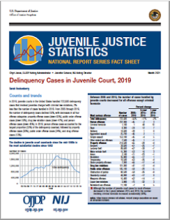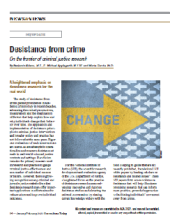Offenses
Spatial Autocorrelation Statistics (CrimeStat IV: A Spatial Statistics Program for the Analysis of Crime Incident Locations, Version 4.0)
Entering Data into CrimeStat IV (CrimeStat IV: A Spatial Statistics Program for the Analysis of Crime Incident Locations, Version 4.0)
License Plate Reader (LPR) Police Patrols in Crime Hot Spots: An Experimental Evaluation in Two Adjacent Jurisdictions
Hidden War: Crime and the Tragedy of Public Housing In Chicago
Delinquency Cases in Juvenile Court, 2019
Anger versus fear about crime: how common is it, where does it come from, and why does it matter?
Opioids, Race, Context, and Journeys to Crime: Analyzing Black-White Differences in Travel Associated With Opioid Possession Offenses
Desistance from Crime: On the Frontier of Criminal Justice Research
Booker and Beyond Analyzing Sentencing Reform and Exploring New Research Directions
This webinar features a discussion of previously published research on the U.S. Supreme Court’s 2005 Booker decision - which effectively transformed the United States Sentencing Guidelines from a mandatory, to an advisory, system. The presentation will address selected research findings from the last 15 years. Individual participants will briefly review their previous research findings with particular attention paid to the analytic methods used.
See the YouTube Terms of Service and Google Privacy Policy
Crime Scene Documentation: Weighing the Merits of Three-Dimensional Laser Scanning
Rapid DNA Crime Scene Sample Multi-Laboratory Evaluation Project
Multilevel Evaluation of Project Safe Neighborhoods
Project Safe Neighborhoods (PSN) is a DOJ-sponsored initiative to reduce violent crime, particularly gun crime, by fostering cooperation by criminal justice agencies and local partners to develop and implement strategic approaches.
See the YouTube Terms of Service and Google Privacy Policy
Comparative Evaluation of Genotyping Technologies for Investigative Genetic Genealogy in Sexual Assault Casework
Federally Backed Human Trafficking Task Force Model Yields Progress, Opportunities for Continued Growth
Enhanced mixture interpretation with long-read DNA sequencing
Evaluation of the Occurrence and Associative Value of NonIdentifiable Fingermarks on Unfired Ammunition in Handguns for Evidence Supporting Proof of Criminal Possession, Use and Intent
NIJ-Funded Research on Firearms Violence in Urban Cities Advancing Scientific Evidence to Inform Practice
In this full thematic panel, renowned experts will present a series of papers summarizing the newest findings of NIJ-funded research projects on criminal offenses with firearms in urban areas. Researchers used various criminological and other theories, including routine activity theory, socio-ecological and socio-environmental perspectives, and advanced mixed-study methods, including surveys and spatio-temporal designs, to produce scientific evidence to inform practice.
See the YouTube Terms of Service and Google Privacy Policy
Desistance From Crime: Implications for Research, Policy, and Practice
Most scholars would agree that desistance from crime – the process of ceasing engagement in criminal activities – is normative. However, there is variability in the literature regarding the definition and measurement of desistance, the signals of desistance, the age at which desistance begins, and the underlying mechanisms that lead to desistance. Even with considerable advances in the theoretical understanding of desistance from crime, there remain critical gaps between research and the application of that research to practice.
See the YouTube Terms of Service and Google Privacy Policy





